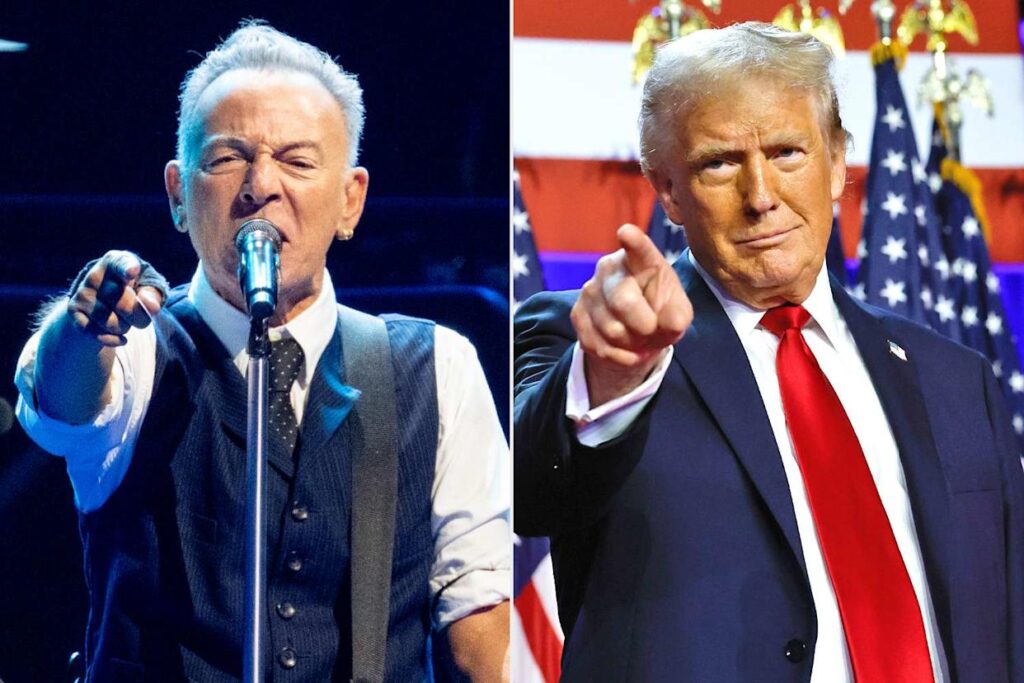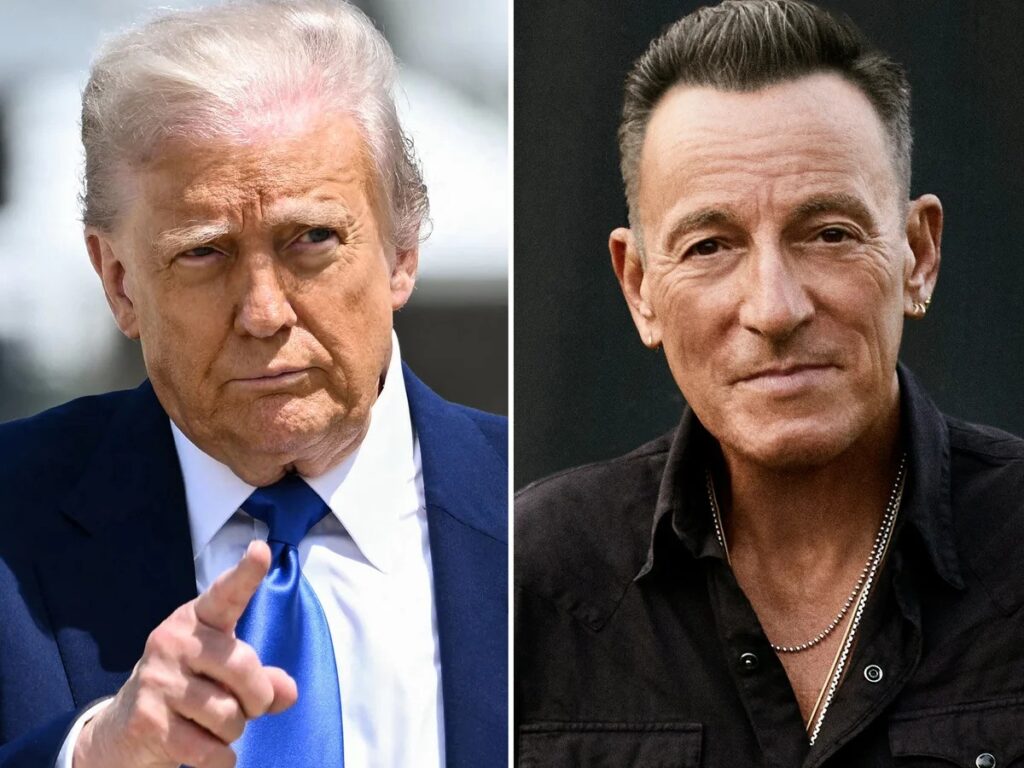In an era where the line between entertainment and politics is increasingly blurred, Bruce Springsteen—the gravel-voiced troubadour who has long chronicled the American experience—has again stepped into the political fray. This time, it’s personal, public, and pointed.
At 75 years old, Springsteen is still packing stadiums and igniting hearts with his signature mix of rock, poetry, and blue-collar truth-telling. But at a recent pair of concerts in Manchester, England, he did more than just play his hits. Standing before a sea of fans at the newly opened Co-op Live arena, Springsteen delivered a blistering critique of former President Donald Trump and what he sees as a dire moment for American democracy.
“This is ‘Land of Hope and Dreams,’” Springsteen told the crowd on May 17, referencing the hopeful anthem that has become a staple of his concerts. “My home America, the America I’ve written about that has been a beacon of hope and liberty for 250 years, is currently in the hands of a corrupt, incompetent and treasonous administration.”
The statement, a clear indictment of Trump’s leadership and the current direction of American politics, echoed comments Springsteen made at the tour’s opening show on May 14. With decades of music that reflects the American working class, the immigrant experience, and a yearning for justice, Springsteen’s words hit with added resonance. He wasn’t just making a political statement—he was aligning it with the core themes that have defined his career.
Springsteen didn’t stop there. He called on his audience—and implicitly, his country—to stand against authoritarianism and protect the principles upon which the U.S. was founded. “Tonight, we ask all who believe in democracy and the best of our American spirit to rise with us, raise your voices and stand with us against authoritarianism and let freedom ring.”
Before launching into “My City of Ruins,” a haunting piece originally written about Asbury Park but later used to reflect on national tragedies, Springsteen added another powerful message about the climate in America.
“There’s some very weird, strange, and dangerous [expletive] going on out there right now,” he said. “In America, they are persecuting people for using their right to free speech and voicing their dissent. This is happening now.”
It was a sobering moment—one that left little doubt that Springsteen, long a defender of the underdog and a believer in democratic ideals, views the current political moment as not just turbulent, but dangerous.

Unsurprisingly, Donald Trump did not take kindly to Springsteen’s remarks.
The former president, known for his combative use of social media, took to his Truth Social platform on May 16 to launch a scathing personal attack. “I see that Highly Overrated Bruce Springsteen goes to a Foreign Country to speak badly about the President of the United States,” Trump wrote. “Never liked him, never liked his music, or his Radical Left Politics.”
The tone quickly turned vitriolic. Trump called Springsteen “not a talented guy” and “a pushy, obnoxious JERK,” suggesting that his support for President Joe Biden—a man Trump continues to deride as “mentally incompetent”—was both misguided and damaging to the country.
He didn’t stop there. In a line that many found alarming, Trump hinted at retaliation should Springsteen repeat such statements on American soil. “This dried out ‘prune’ of a rocker (his skin is all atrophied!) ought to KEEP HIS MOUTH SHUT until he gets back into the Country, that’s just ‘standard fare.’ Then we’ll all see how it goes for him!”
For critics, that last sentence was chilling—a not-so-subtle threat from a former president who is once again campaigning to return to the White House.
Springsteen’s comments and Trump’s response have sparked a cultural and political flashpoint, one that is galvanizing much of the music world.
At their May 16 show in Pittsburgh, Pearl Jam performed a moving rendition of “My City of Ruins,” as a tribute to Springsteen and his message. Jason Isbell, the Southern singer-songwriter known for his own politically conscious lyrics, performed Springsteen’s “Cover Me” at his show in Red Bank, New Jersey—just miles from Springsteen’s own home in Colts Neck.
The American Federation of Musicians also issued a statement of solidarity on May 16, defending both Springsteen and fellow musician Taylor Swift, who Trump also insulted the same day.
“The American Federation of Musicians of the United States and Canada will not remain silent as two of our members − Bruce Springsteen and Taylor Swift − are singled out and personally attacked by the President of the United States,” the organization wrote. “Bruce Springsteen and Taylor Swift are not just brilliant musicians, they are role models and inspirations to millions of people in the United States and across the world. … Musicians have the right to freedom of expression, and we stand in solidarity with all our members.”
The support underscores a growing movement in the music and arts communities to resist political intimidation and defend the rights of artists to speak out on social and political issues.
Adding a twist to the feud is the fact that Springsteen and Trump are, in a way, neighbors. The two men both have homes in Colts Neck, New Jersey, a rural and affluent enclave where horse farms are as common as McMansions. Trump owns the Trump National Golf Club there, and Springsteen has lived in the area for years.
Their lives have even intersected socially—Trump attended several equestrian events where Jessica Springsteen, Bruce’s daughter and a world-class show jumper, competed. That shared geography makes the public animosity all the more striking.
What was once merely a war of ideologies has now become deeply personal, as if two titans of New Jersey—one cultural, one political—are locked in a bitter struggle not just for attention, but for the very soul of their shared homeland.
Springsteen’s criticism of Trump isn’t new. Since 2016, he has spoken out against the former president’s rhetoric and policies, describing them as divisive and contrary to American ideals. However, this tour marks the first time he’s brought such commentary directly to the concert stage.
That distinction matters. Springsteen’s concerts have always been about more than just music—they’re part revival, part protest, part communal storytelling. His songs capture the lived experiences of Americans from all walks of life: veterans, factory workers, immigrants, dreamers, and the disillusioned. By introducing overt political commentary into these performances, Springsteen is leveraging his platform to engage fans in the broader struggle for democracy and justice.

This clash between Springsteen and Trump is emblematic of a broader cultural reckoning taking place in the United States. We are living in a moment where artists are no longer content to remain silent in the face of political injustice. Whether it’s Taylor Swift advocating for voter turnout, Billie Eilish speaking out on climate change, or Springsteen defending democratic ideals, today’s musicians are increasingly using their platforms as tools for social change.
Yet with that activism comes backlash. Trump’s attacks reflect a worldview in which dissent is dangerous, protest is unpatriotic, and public figures who disagree with him deserve ridicule, if not punishment.
For many Americans, this attitude represents a threat not just to civil discourse, but to the foundational freedoms enshrined in the Constitution.
Springsteen’s message is as much a warning as it is a call to action. His concern about authoritarianism, suppression of free speech, and erosion of democratic norms is shared by many, both in and outside the U.S.
And he’s not alone in using the stage as a podium. Across the country and the world, artists are raising their voices to speak truth to power, refusing to be silenced. As Springsteen put it, “In America, they are persecuting people for using their right to free speech.” That reality, he warns, must not go unchallenged.
The reaction from his fans—thunderous applause, emotional responses, and a wave of support across social media—suggests that many agree. In a time of deep political division and social unrest, they’re looking to figures like Springsteen not just for entertainment, but for leadership.
At its surface, this may look like a celebrity spat between a rock legend and a former president. But it’s far more significant than that.
This is a confrontation between two visions of America—one rooted in compassion, inclusion, and democratic ideals; the other in authoritarianism, grievance, and control. Springsteen represents an America that still believes in liberty and justice for all. Trump, increasingly, represents a faction that sees dissent as dangerous and seeks to marginalize those who question authority.
Bruce Springsteen, standing on a stage halfway across the world, has made it clear which side of that divide he stands on. The question now is: who will stand with him?



